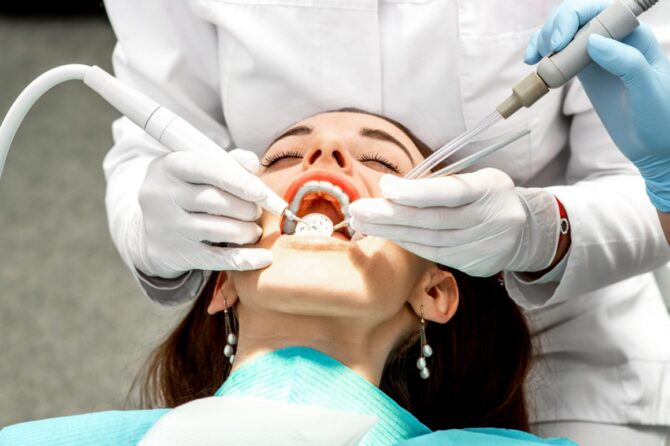
‘Gum pain after cleaning’: What’s the cause?
You’re not alone if you’re wondering why your teeth hurt after your dentist has cleaned them. After a dental cleaning, many people experience gum pain, and it’s important to seek treatment as soon as possible. This pain can be caused by many factors, such as using certain instruments or products or even the composition of your saliva. You could experience demineralized enamel, the earliest sign of tooth decay.
In this blog post, we’ll explore the possible causes of ‘gum pain after cleaning’ and what you can do to alleviate it. Stay tuned!
Why do my teeth hurt after the dentist cleaned them?
If you’ve ever had your teeth cleaned by a dentist, you know that they can feel sensitive after the process. During a dental cleaning, tartar is removed from teeth and gums. The process irritates the gums, which is normal and doesn’t last very long. Healthy gums will be less sensitive, but those with gum disease may feel more pain after the cleaning.
You may experience pain after a dental cleaning, especially if you’re not brushing and flossing your teeth properly. This is usually caused by a buildup of plaque and tartar on the teeth. If you’re feeling pain, you should immediately tell your dentist or hygienist. This way, they can adjust their procedures to minimize pain.

Some people experience tooth sensitivity, also known as dentin hypersensitivity. This occurs when the dentist cleans deeper than you can at home, exposing the underlying roots of the teeth. Because root surfaces do not have hard enamel, they are very sensitive. Fortunately, most of the time, this discomfort will pass within a few days.
Another common cause of sensitivity is receding gums, which expose the tooth roots. Root surfaces are made up of tiny channels that run to the tooth pulp, which contains the nerve center.
The Causes of Gum Pain After Cleaning
Gum pain after cleaning your teeth can be uncomfortable, but it’s usually nothing to worry about. There are a few different reasons why your gums might hurt after cleaning, and we’re here to give you the scoop.
Tartar buildup
Gum pain is a common symptom of tartar buildup. This deposit forms above the gum line, which must be removed with special instruments in the dentist’s office. This buildup is bad for your teeth because it can lead to tooth decay and receding gums. It also contains bacteria that irritate your gums and contribute to gum disease.
You can treat gum pain by following the right oral hygiene routine and visiting your dentist regularly. Brushing your teeth regularly removes most of the plaque on your teeth, but when left alone, it combines with saliva and hardens into tartar. Studies show that 92 percent of adults have a visible layer of tartar on their teeth. This buildup is not only bad for your oral health but can also affect your daily life. Moreover, you should visit a dentist for professional cleanings at least twice a year to avoid tartar buildup. In addition to dental cleanings, dentists can also use root planning to treat gum pain.
Tooth Sensitivity
If you notice that your teeth feel sensitive after cleaning, you must see your dentist for a dental exam. Your dentist can look for problems such as cavities or loose fillings during the checkup. They will also check your gums for recessed areas. Depending on the cause of your gum pain, your dentist may recommend treatment, or they may order an X-ray. In mild cases, you can treat the problem yourself using over-the-counter treatments.
Some causes of tooth sensitivity include too much pressure when brushing, acidic food and drinks, and dental procedures. These conditions can damage the enamel on teeth, causing sensitive teeth. Drinking too much acidic or hot or cold beverages may also cause your teeth to be sensitive. Fluoride mouth rinse can also help strengthen the enamel on your teeth.

Sometimes, you may also experience pain after brushing or flossing your teeth. This is because the tools used for cleaning your teeth can cause abrasion on the enamel and gum tissue, making the teeth more sensitive.
Inflamed gums
Symptoms of gum pain can include swelling, sensitivity, and a strange taste. You may also experience bleeding if you are pregnant or have had a long break between cleanings. Some people experience bleeding due to hormones during their menstrual cycle or pregnancy. In addition, you may have an allergic reaction to prophy paste or even if your hygienist used a rough technique.
After a dental cleaning, you may experience swollen, red, and tender gums. These are perfectly normal, but you should immediately call your dentist if the pain persists. When you experience gum pain after cleaning, you may have gingivitis, a condition that causes the gums to bleed. You can relieve this condition by rinsing with a warm saltwater solution. This solution should be used three to four times daily. You may also suffer from a lack of certain vitamins or minerals, so you should see your dentist.
You may need to take ibuprofen to relieve the swelling. If the swelling lasts longer than a week, you should call your dentist for a consultation.
Leaky Fillings
Pain in the gum area around a tooth is a common symptom of a cavity near the pulp. This decay can become infected and cause a tooth to need a root canal or extraction. Sometimes, a crack in a filling can allow bacteria to enter the tooth and infect the sensitive inner pulp.
A loose filling can also cause an ill-fitting bite when you close your mouth. Because of this, a loose filling may also cause your teeth to appear to have a different shape or size. If the filling is too high, it can cause your teeth to shift out of place and cause toothaches and discomfort. In addition, large fillings make it more difficult to clean your teeth. This means you’re more likely to experience tooth decay.
Leaky fillings can cause a lot of pain. They can cause your teeth to be sensitive and even lead to tooth loss if they are not treated. A dentist can spot this condition during routine checkups and treat it before it becomes serious. To prevent the pain, make an appointment with your dentist right away.
Gum recession
Gum recession can be an undesirable side effect of dental cleaning. The gum tissue recedes too far over the teeth’s roots. While there is no way to prevent this from happening, it can be slowed down and possibly reversed with periodontal therapy. To achieve this, your dentist will perform scaling and root planning procedures. This procedure removes bacteria and tartar from pockets while securing the gum tissue over the tooth’s root.
A good oral rinse can help reattach your gum tissue to your teeth. Saltwater contains natural antibacterial properties and soothes inflamed gum tissue. A daily rinse using saltwater will help prevent further damage and reverse the signs of gum recession. In addition, regular dental checkups can help slow down this condition.
If your gums continue to recede, you may need a deep cleaning. Deep cleaning is not always enough to reverse the problem, as the condition may have caused bone loss. If the gum recession is severe, your dentist may perform surgery to correct the problem. This procedure may involve cutting tissues from the roof of the mouth.
Dental procedures
After dental procedures, you may experience pain in your mouth and gums. There are several possible causes.
- One of these is an infection. Your dentist may recommend antibiotics before extraction to prevent infection.
- Another reason for discomfort after dental procedures is a strained jaw or muscle. You should consult your dentist if you experience severe jaw pain. You can also try applying warm compresses to the sore area and practicing gentle stretching exercises.
- Sometimes, simple fillings or aggressive tooth preparation can damage the tooth’s nerve. These can lead to pulpitis. Fortunately, most cases of pulpitis go away on their own, but in other cases, your dentist may need to perform a root canal to correct the damage.
- Other common causes of gum pain include injuries to soft tissue or incisions. Generally, these are minor problems that disappear after a few days. Sometimes, however, they may persist for three to five days. In some cases, tooth extraction can leave your mouth tender for days. Similarly, routine dental cleanings may leave your mouth tender for a day or two.
How do you relieve gum pain after a dental cleaning?
If you want to relieve gum pain after a dental cleaning, there are several home remedies that you can try:
Hydrogen peroxide solution
One of the easiest ways to relieve gum pain is to swish a cup of warm water with a teaspoon of hydrogen peroxide. The hydrogen peroxide will soothe and reduce inflammation. In addition, it can also kill germs. It also has antiseptic properties and can help combat various oral problems. However, you should avoid swallowing the solution!
Cloves or turmeric paste
Another option to relieve gum pain is to use a paste made from cloves or turmeric. You should apply it to the painful gums after swishing water and rinsing it thoroughly.
Cold or hot compress
You can also apply a cold or hot compress to relieve the pain. Cold compresses can help reduce swelling, and you can use an ice pack wrapped in a clean washcloth. You should not apply ice packs for more than 15 minutes, however.
Dental spray
Alternatively, you can apply a dental spray containing essential oils. Clove, ginger, and oregano oils are good choices, as they have anti-inflammatory properties and help reduce inflammation.
Are there any long-term complications associated with gum pain after cleaning?
If you experience gum pain after cleaning, it is important to seek medical attention. While no long-term complications are associated with this condition, it can be extremely painful and may lead to further dental problems if left untreated. Your dentist will be able to provide you with the necessary treatment to relieve your pain and prevent any further damage to your teeth and gums.
What soothes sore gums after cleaning?
You can do a few things to soothe your sore gums after a deep cleaning:
- Rinse your mouth with warm water.
- Use a soft toothbrush to brush your gums gently. You can also try using an ice pack or a warm compress to reduce swelling and pain.
- Take over-the-counter pain relievers such as ibuprofen or acetaminophen to help relieve pain.
If your pain is severe, you may need to see a dentist for more treatment options.
If you’re experiencing gum pain after cleaning your teeth, there’s no need to panic! In most cases, the pain is just due to inflammation or sensitivity and will go away within a day or two. However, if you’re concerned about the pain or notice other symptoms like redness, swelling, or bleeding (especially when brushing or flossing), it’s important to talk to your dentist immediately so they can diagnose any underlying problems and put together a treatment plan accordingly.
If you’re suffering from gum recession after a dental cleaning, it’s important to take action to protect your smile. Dental Pro 7 can help. This product is designed to cleanse your gums and teeth while preventing further gum recession. It’s easy to use, and it’s gentle on your gums.
>>>Visit Dental Pro 7 today to learn more about how it can help you get your smile back.
Leave a reply